148 scholarly books by Karolinum Press and 10
have author last names that start with D
148 scholarly books by Karolinum Press and 10
148 scholarly books by Karolinum Press
10 have author last names that start with D have author last names that start with D
10 have author last names that start with D have author last names that start with D
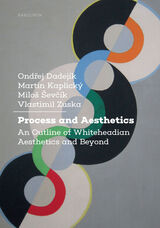
Process and Aesthetics
An Outline of Whiteheadian Aesthetics and Beyond
Ondrej Dadejík
Karolinum Press, 2021
A groundbreaking analysis of Alfred North Whitehead’s thinking on aesthetics.
Though philosopher Alfred North Whitehead did not dedicate any books or articles specifically to aesthetics, aesthetic motifs nonetheless permeate his entire body of work. Despite this, aestheticians have devoted little attention to Whitehead. In this book, four scholars of aesthetics provide another angle from which Whiteheadian aesthetics might be reconstructed. Paying special attention to the notion of aesthetic experience, the authors analyze abstraction versus concreteness, immediacy versus mediation, and aesthetic contextualism versus aesthetic isolationism. The concepts of creativity and rhythm are crucial to their interpretation of Whiteheadian aesthetics. Using these concepts, the book interprets the motif of the processes by which experience is harmonized, the sensation of the quality of the whole, and directedness towards novelty.
Though philosopher Alfred North Whitehead did not dedicate any books or articles specifically to aesthetics, aesthetic motifs nonetheless permeate his entire body of work. Despite this, aestheticians have devoted little attention to Whitehead. In this book, four scholars of aesthetics provide another angle from which Whiteheadian aesthetics might be reconstructed. Paying special attention to the notion of aesthetic experience, the authors analyze abstraction versus concreteness, immediacy versus mediation, and aesthetic contextualism versus aesthetic isolationism. The concepts of creativity and rhythm are crucial to their interpretation of Whiteheadian aesthetics. Using these concepts, the book interprets the motif of the processes by which experience is harmonized, the sensation of the quality of the whole, and directedness towards novelty.
[more]
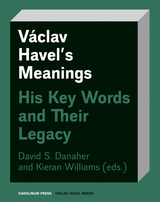
Václav Havel’s Meanings
His Key Words and Their Legacy
David Danaher
Karolinum Press, 2022
A close read of the rich collections of texts left behind by Václav Havel, one of the most important Czech thinkers and leaders of the twentieth century.
No one in Czech politics or culture could match the international stature of Václav Havel at the time of his death in 2011. In the years since his passing, his legacy has only grown, as developments in the Czech Republic and elsewhere around the world continue to show the importance of his work and writing against a range of political and social ills, from autocratic brutality to messianic populism.
This book looks squarely at the heart of Havel’s legacy: the rich corpus of texts he left behind. It analyzes the meanings of key concepts in Havel’s core vocabulary: truth, power, civilsociety, home, appeal, indifference, hotspot, theatre, prison, and responsibility. Where do these concepts appear in Havel’s oeuvre? What part do they play in his larger intellectual project? How might we understand Havel’s focus on these concepts as a centerpiece of his contribution to contemporary thought? How does Havel’s particular perspective on the meaning of these concepts speak to us in the here and now? The ten contributors use a variety of methodological tools to examine the meaning of these concepts, drawing on a diversity of disciplines: political science and political philosophy, historical and cultural analysis, discourse/textual analysis, and linguistic-corpus analysis.
No one in Czech politics or culture could match the international stature of Václav Havel at the time of his death in 2011. In the years since his passing, his legacy has only grown, as developments in the Czech Republic and elsewhere around the world continue to show the importance of his work and writing against a range of political and social ills, from autocratic brutality to messianic populism.
This book looks squarely at the heart of Havel’s legacy: the rich corpus of texts he left behind. It analyzes the meanings of key concepts in Havel’s core vocabulary: truth, power, civilsociety, home, appeal, indifference, hotspot, theatre, prison, and responsibility. Where do these concepts appear in Havel’s oeuvre? What part do they play in his larger intellectual project? How might we understand Havel’s focus on these concepts as a centerpiece of his contribution to contemporary thought? How does Havel’s particular perspective on the meaning of these concepts speak to us in the here and now? The ten contributors use a variety of methodological tools to examine the meaning of these concepts, drawing on a diversity of disciplines: political science and political philosophy, historical and cultural analysis, discourse/textual analysis, and linguistic-corpus analysis.
[more]
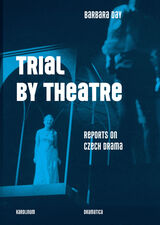
Trial by Theatre
Reports on Czech Drama
Barbara Day
Karolinum Press, 2019
The motto “Národ sobě”—“From the Nation to Itself”—inscribed over the proscenium arch of Prague’s National Theatre symbolizes the great importance theater holds for the Czechs. It also belies an extraordinary history of subversion, repression, and an enduring capacity for reinvention. In Trial by Theatre, Barbara Day sets that story in its political and sociological contexts, painting a vivid portrait of the evolving nature and importance of Czech theater that illuminates the nation’s history more broadly.
Drawing on a range of oral and written sources, as well as her unique personal experience of cultural and historical events in Czechoslovakia from the 1960s to the 1980s, Day offers a sweeping view of Czech theater, its colorful personalities, and international connections. Her story details: the days of the National Awakening in the nineteenth century, when theater took the place of politics, becoming an instrument of national identity in the hands of the revivalists; theater as a symbol of independence during the Nazi occupation; its survival of Socialist Realism and Stalinism and subsequent blossoming in the “Golden Sixties”; and theater’s essential role in Prague Spring and beyond, when for two decades theater operated in provisional spaces like gymnasiums, bars, trade union halls, art galleries, and living rooms. Trial by Theatre culminates in the Velvet Revolution of 1989, a year that saw the installation of Václav Havel—a playwright—as the first post-Communist president of Czechoslovakia.
Drawing on a range of oral and written sources, as well as her unique personal experience of cultural and historical events in Czechoslovakia from the 1960s to the 1980s, Day offers a sweeping view of Czech theater, its colorful personalities, and international connections. Her story details: the days of the National Awakening in the nineteenth century, when theater took the place of politics, becoming an instrument of national identity in the hands of the revivalists; theater as a symbol of independence during the Nazi occupation; its survival of Socialist Realism and Stalinism and subsequent blossoming in the “Golden Sixties”; and theater’s essential role in Prague Spring and beyond, when for two decades theater operated in provisional spaces like gymnasiums, bars, trade union halls, art galleries, and living rooms. Trial by Theatre culminates in the Velvet Revolution of 1989, a year that saw the installation of Václav Havel—a playwright—as the first post-Communist president of Czechoslovakia.
[more]
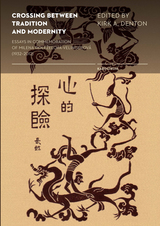
Crossing between Tradition and Modernity
Essays in Commemoriation of Milena Doležalová-Velingerová (1932–2012)
Kirk A. Denton
Karolinum Press, 2017
Crossing Between Tradition and Modernity presents thirteen essays written in honor of Milena Doleželová-Velingerová (1932–2012), a member of the Prague School of Sinology and an important scholar of Chinese literature who was at the forefront in introducing literary theory into sinology. Doleželová-Velingerová was that rare scholar who wrote with equal knowledge and skill about both modern and premodern Chinese literature. The essays emulate Doleželová-Velingerová’s scholarship in terms of treating a broad range of historical periods, literary genres, and topics—from Tang travel essays to cultural identity in postcolonial Hong Kong. Organized into two parts, “Language, Structure, and Genre,” and “Identities and Self-Representations,” the essays are motivated by an abiding concern with issues of language, narrative structure, and the complex nature of literary meaning that were at the heart of Doleželová-Velingerová’s work.
[more]
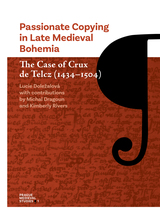
Passionate Copying in Late Medieval Bohemia
The Case of Crux de Telcz (1434–1504)
Lucie Doležalová
Karolinum Press, 2021
A case study of the unusual liberties taken by the fifteenth-century Bohemian scribe Crux of Telcz.
Passionate Copying in Late Medieval Bohemia addresses a unique case in the culture of manuscript transcription and textual transmission during the late fifteenth century, a transformative period in book history. This period is marked by the widespread intrusion of an unprecedented number of scribal paratexts—tables of contents, indices, explanatory notes, etc.—into transcribed manuscripts. To explore this development, the authors dig deep into a detailed case study of the Bohemian scribe Crux of Telč (1434–1504). Unlike most medieval copyists, who were stringent in their work even when inserting paratexts, Crux of Telč is notable for the extreme liberties he took with manuscript contents. Sometimes diligent, sometimes careless, his copies are notably rife with his own inventions and additions to the text. Crux’s life story is meticulously reconstructed in this book, relying on his colophons—the personal annotations left by medieval copyists to identify themselves and their circumstances—and other personal notes. The singularity of his approach to manuscripts is reinforced by the authors’ inclusion of a study of another late medieval scribe, Johannes Sintram of Würtzburg (d. 1450), whose scrivening is compared with that of Crux of Telč.
Passionate Copying in Late Medieval Bohemia addresses a unique case in the culture of manuscript transcription and textual transmission during the late fifteenth century, a transformative period in book history. This period is marked by the widespread intrusion of an unprecedented number of scribal paratexts—tables of contents, indices, explanatory notes, etc.—into transcribed manuscripts. To explore this development, the authors dig deep into a detailed case study of the Bohemian scribe Crux of Telč (1434–1504). Unlike most medieval copyists, who were stringent in their work even when inserting paratexts, Crux of Telč is notable for the extreme liberties he took with manuscript contents. Sometimes diligent, sometimes careless, his copies are notably rife with his own inventions and additions to the text. Crux’s life story is meticulously reconstructed in this book, relying on his colophons—the personal annotations left by medieval copyists to identify themselves and their circumstances—and other personal notes. The singularity of his approach to manuscripts is reinforced by the authors’ inclusion of a study of another late medieval scribe, Johannes Sintram of Würtzburg (d. 1450), whose scrivening is compared with that of Crux of Telč.
[more]
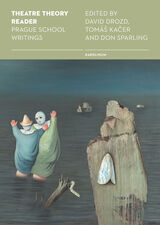
Theatre Theory Reader
Prague School Writings
David Drozd
Karolinum Press, 2017
The Theatre Theory Reader provides the first comprehensive and critical anthology of texts reflecting on the development of the theater theory of the Prague School—or Prague Linguistic Circle—beginning with early twentieth-century composer and aesthetician Otakar Zich. The majority of the thirty-eight texts date from the 1930s and early 1940s, the period when the Prague Linguistic Circle was most active as both a theoretical laboratory and a focal point for scholars, artists, and intellectuals. A substantial afterword places these writings in context, describing the emergence of the Prague School in an effort to promote a deeper understanding of its texts. Organized thematically and structurally rather than chronologically, the Theatre Theory Reader explores issues and themes in the study of the theater as an art form and as artistic practice. Just as the Prague School theorists viewed theory as a toolbox of approaches to theater analysis, this anthology should be considered a toolbox of analytic possibilities.
[more]
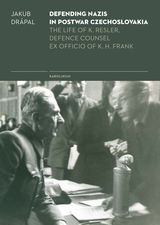
Defending Nazis in Postwar Czechoslovakia
Life of K. Resler, Defense Councel Ex Officio of K. H. Frank
Jakub Drápal
Karolinum Press, 2018
In this book, Czech lawyer and scholar Jakub Drápal tells the story of the life of Kamill Resler, an attorney who defended the most prominent Nazi tried in postwar Czechoslovakia: Karl Hermann Frank, who would go on to be executed for his role in organizing the massacres of the Czech villages Lidice and Ležáky in 1942. Celebrating Resler’s lifelong commitment to justice—to honoring even the most nefarious criminals’ right to a defense—Drápal highlights events that influenced Resler’s outlook and legal career, important cases that preceded Frank’s trial, Resler’s subsequent defenses of other Nazi criminals, and the final years of Resler’s life under the communist regime.
[more]
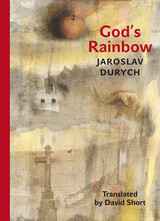
God's Rainbow
Jaroslav Durych
Karolinum Press, 2016
This is a book about collective guilt, individual fate, and repentance, a tale that explores how we can come to be responsible for crimes we neither directly commit nor have the power to prevent. Set in the Czechoslovakian borderland shortly after WWII amid the sometimes violent expulsion of the region’s German population, Jaroslav Durych’s poetic, deeply symbolic novel is a literary touchstone for coming to terms with the Czech Republic’s difficult and taboo past of state-sanctioned violence.
A leading Catholic intellectual of the early twentieth century, Durych became a literary and political throwback to the prewar Czechoslovak Republic and faced censorship under the Stalinist regime of the 1950s. As such, he was a man not unfamiliar with the ramifications of a changing society in which the minority becomes the rule-making political authority, only to end up condemned as criminals. Though Durych finished writing God’s Rainbow in 1955, he could not have hoped to see it published in his lifetime. Released in a still-censored form in 1969, God’s Rainbow is available here in full for the first time in English.
A leading Catholic intellectual of the early twentieth century, Durych became a literary and political throwback to the prewar Czechoslovak Republic and faced censorship under the Stalinist regime of the 1950s. As such, he was a man not unfamiliar with the ramifications of a changing society in which the minority becomes the rule-making political authority, only to end up condemned as criminals. Though Durych finished writing God’s Rainbow in 1955, he could not have hoped to see it published in his lifetime. Released in a still-censored form in 1969, God’s Rainbow is available here in full for the first time in English.
[more]
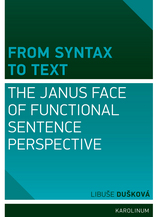
From Syntax to Text
The Janus Face of Functional Sentence Perspective
Libuse Dusková
Karolinum Press, 2015
The volume deals with the interaction between syntax, informational structure (or functional sentence perspective), and text in present-day English and Czech. Libuše Dušková focuses on the two facets of functional sentence perspective: syntactic structures as carriers of informational structure functions and the connection of functional sentence perspective within the level of text. Functional sentence perspective is investigated as a potential factor of syntactic divergence between English and Czech, and the role of functional sentence perspective is examined with respect to theme development, text build-up, and style. Other topics include the hierarchical relationship between syntax and functional sentence perspective and general and specific questions of word order, with major attention paid to the role of semantics.
[more]
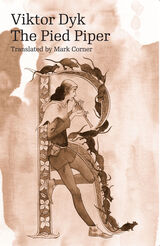
The Pied Piper
Viktor Dyk
Karolinum Press, 2018
For The Pied Piper, Czech writer Viktor Dyk found his muse in the much retold medieval Saxon legend of the villainous, pipe-playing rat-catcher. Dyk uses the tale as a loose frame for his story of a mysterious wanderer, outcast, and would-be revolutionary—a dreamer typical of fin de siècle Czech literature who serves Dyk as a timely expression of the conflict between the petty concerns of bourgeois nineteenth-century society and the coming artistic generation. Impeccably rendered into English by Mark Corner, The Pied Piper retains the beautiful style of Dyk’s original Czech. The inspiration for several theatrical and film adaptations, including a noted animated work from critically acclaimed director Jiří Barta, Dyk’s classical novella is given new life by Corner’s translation, proving that the piper is open to new interpretations still.
[more]
READERS
Browse our collection.
PUBLISHERS
See BiblioVault's publisher services.
STUDENT SERVICES
Files for college accessibility offices.
UChicago Accessibility Resources
home | accessibility | search | about | contact us
BiblioVault ® 2001 - 2024
The University of Chicago Press









